Are you ready to embark on an exciting new adventure? Join me as we explore the wonderful world of starting gardening as a hobby. Gardening is not only a rewarding pastime but also a great way to connect with nature and find joy in nurturing plants. Whether you have a spacious backyard or a small balcony, there’s always room to create your own green oasis.
Starting gardening as a hobby can be both exciting and fulfilling. It offers countless benefits, from the simple pleasure of watching your plants grow to the satisfaction of harvesting fresh produce you grew yourself. Gardening also provides an excellent opportunity for physical activity and stress reduction, allowing you to unwind and find tranquility in nature.
Key Takeaways:
- Gardening is a rewarding hobby that allows you to connect with nature and enjoy the beauty of plants.
- Consider your local climate and soil conditions when deciding what to grow.
- Prepare the ground by clearing weeds and testing the soil.
- Choose the right plants for your garden, such as perennials or annuals.
- Water and care for your garden to ensure its health and productivity.
Why Choose Gardening as a Hobby?
Curious about why gardening makes a fantastic hobby choice, especially for beginners? Let me share some insights and tips to help you get started. Gardening offers a multitude of benefits, from the joy of connecting with nature to the satisfaction of watching your plants grow. It allows you to create a beautiful outdoor space, cultivate your own food, and enjoy the therapeutic benefits of nurturing living things.
One of the reasons gardening is a great hobby for beginners is that it can be easily tailored to fit your lifestyle and space. Whether you have a large backyard or a small balcony, there are gardening options available for everyone. Container gardening is an excellent choice for those with limited space, allowing you to grow a variety of plants in pots or hanging baskets. Raised bed gardening is another beginner-friendly option, providing better control over soil quality and reducing the need for bending or kneeling.
As a beginner gardener, you can start with easy-to-grow plants that require minimal maintenance, such as herbs, lettuce, or marigolds. These plants are resilient and forgiving, making them perfect for those new to gardening. With a little bit of care and attention, you’ll soon witness the miraculous transformation from seeds to thriving plants. Remember to consider your local climate and soil conditions when choosing plants, as some varieties may be better suited to your region than others.
| Benefits of Gardening as a Hobby | Gardening Tips for Beginners |
|---|---|
| • Connect with nature | • Start with easy-to-grow plants |
| • Watch your plants grow | • Consider local climate and soil conditions |
| • Create a beautiful outdoor space | • Choose the right gardening tools |
| • Cultivate your own food | • Water and care for your garden |
| • Enjoy therapeutic benefits | • Protect yourself from the sun |
Quote:
“Gardening is a wonderful way to relax and unwind. It allows you to connect with nature, enjoy the beauty of plants, and create a peaceful sanctuary right in your own backyard. Whether you’re a beginner or an experienced gardener, there is always something new to learn and discover. So grab a shovel, put on your gardening gloves, and let the magic of gardening unfold.”
Gardening is not only a hobby but also a wonderful way to improve your overall well-being. It provides physical activity, helping you stay active and fit. The satisfaction of growing your own fruits, vegetables, and herbs allows you to enjoy the freshest produce right from your garden to your plate. Gardening also promotes mental well-being and stress reduction, as the act of nurturing plants and witnessing their growth brings a sense of peace and tranquility. So why not give gardening a try? Embrace the joy of starting a new hobby and experience the immense rewards it can bring to your life.
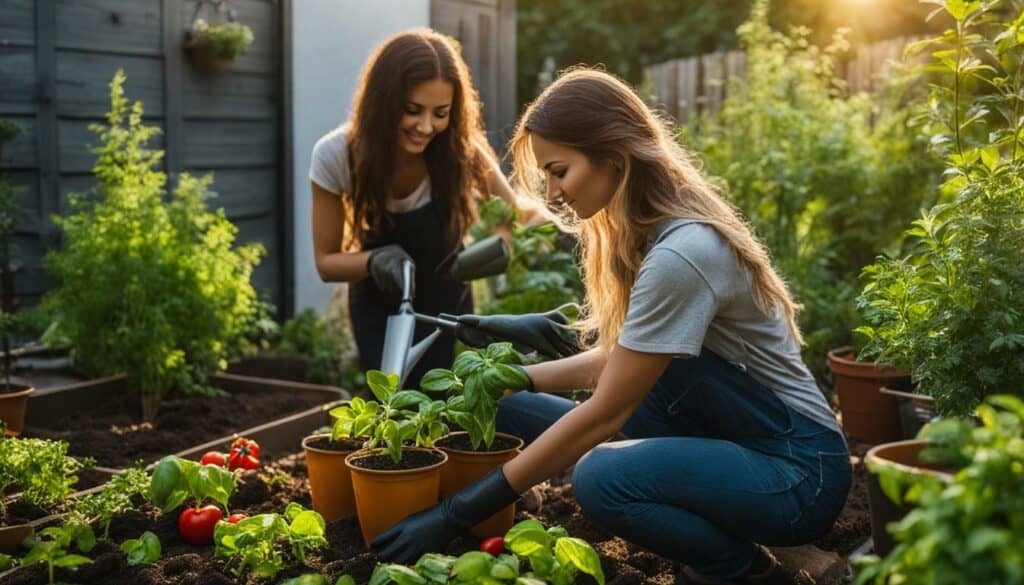
Getting Started: How to Start Gardening
Ready to get your hands dirty? Let’s dive into the basics of how to start gardening and lay the groundwork for a thriving garden. Starting gardening as a hobby is an exciting adventure that allows you to connect with nature, enjoy the beauty of plants, and reap the rewards of your hard work.
The first step in starting a garden is to determine what you want to grow. Consider your local climate and soil conditions to choose plants that will thrive in your area. If you’re a beginner, it’s best to start with easy-to-grow plants like perennials or annuals. These plants are more forgiving and will give you a sense of accomplishment as you watch them grow.
Once you’ve decided on the plants, it’s time to prepare the ground. Clear any weeds or debris from the area and test the soil to determine its type and quality. This will help you understand what amendments may be needed to create the optimal growing conditions for your plants. You can find soil testing kits at your local gardening center or have a professional analyze it for you.
Soil Types
| Soil Type | Description |
|---|---|
| Clay Soil | Compacted and heavy, drains poorly |
| Sandy Soil | Loose and well-draining, dries out quickly |
| Loam Soil | Well-balanced, retains moisture without becoming waterlogged |
Once the soil is prepared, it’s time to plant your chosen garden. Follow the instructions on the plant tags or seed packets for proper planting depth and spacing. Remember to water your garden regularly, especially in the early stages of growth. Caring for your garden includes regular watering, fertilizing, and keeping an eye out for common pests and diseases that may affect your plants. By staying attentive and proactive, you can ensure the health and vitality of your garden.
Gardening is not only a rewarding hobby, but it also offers numerous health benefits. It provides physical activity, reduces stress, and allows you to enjoy fresh produce straight from your garden. To make the most of your gardening journey, it’s essential to have the right tools and gear, take breaks when needed, stay hydrated, and protect yourself from the sun. If you’re gardening with kids, make it a fun and educational experience for them by providing age-appropriate tools and creating a “pizza garden” with ingredients they can use to make their own pizza.
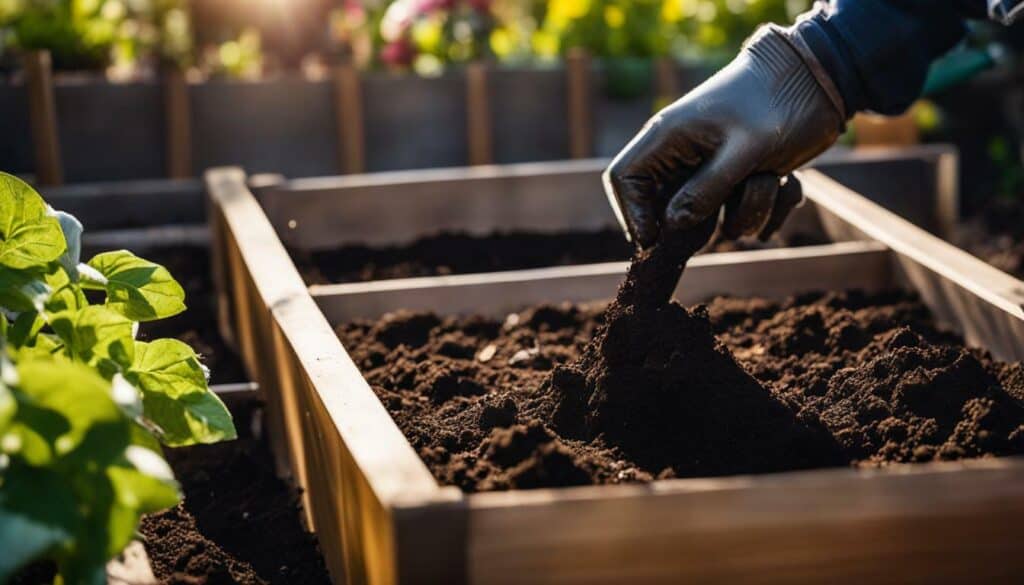
So, grab your gardening gloves and get ready to embark on a delightful gardening adventure. Starting gardening as a hobby is not only a way to beautify your surroundings but also a pathway to connect with nature and enjoy the simple pleasures of watching your garden bloom.
Essential Gardening Tools for Beginners
The right tools can make all the difference in your gardening journey. Discover the essential gardening tools every beginner should have in their arsenal.
1. Spade: A sturdy and sharp spade is essential for digging, turning soil, and creating planting holes. Look for one with a comfortable handle and a durable blade.
2. Trowel: A trowel is a versatile tool that is great for planting, transplanting, and weeding. Choose one with a comfortable grip and a strong blade.
3. Gloves: Protect your hands from dirt, thorns, and sharp edges with a pair of gardening gloves. Look for gloves that fit well and offer good dexterity.
4. Watering Can: Keeping your plants properly hydrated is crucial for their growth and health. Invest in a sturdy watering can with a long spout for easy watering.
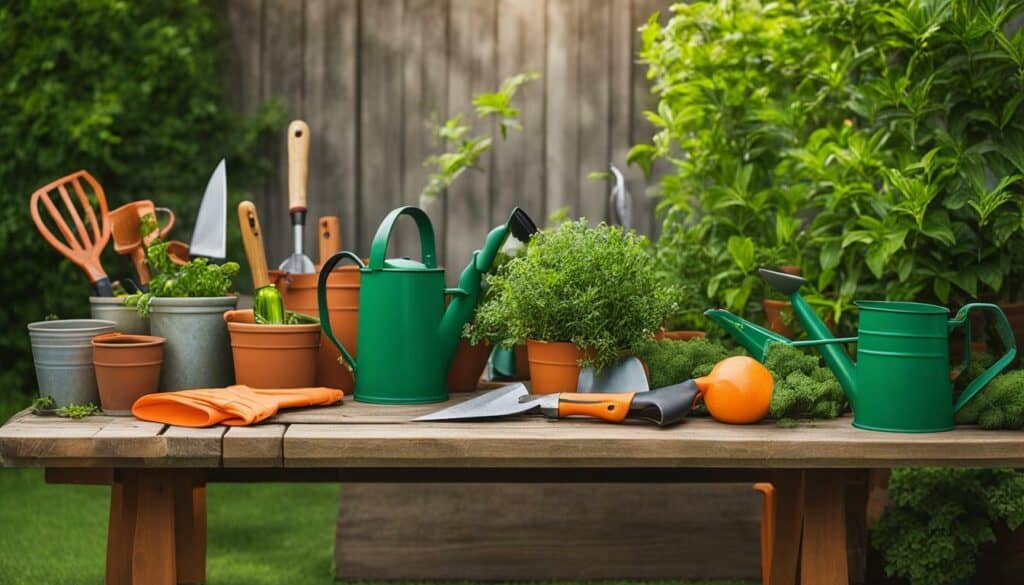
| Tool | Description |
|---|---|
| Spade | A sturdy and sharp tool for digging and turning soil. |
| Trowel | A versatile tool for planting, transplanting, and weeding. |
| Gloves | Protective gear to keep your hands safe while gardening. |
| Watering Can | Ensures your plants get the water they need to thrive. |
Remember, having the right tools not only makes gardening easier but also more enjoyable. So, equip yourself with these essential gardening tools and embark on your gardening adventure with confidence!
Choosing the Right Plants for Beginners
Ready to start planting? Let’s explore the world of beginner-friendly plants and uncover the secrets to selecting the perfect green companions for your garden.
When choosing plants for your garden, it’s important to consider your local climate and soil conditions. Some plants thrive in sunny, dry environments, while others prefer shade or moist soil. Take the time to assess your garden’s conditions and choose plants that will thrive in that specific environment. This will ensure a higher chance of success and a more enjoyable gardening experience.
One of the best options for beginner gardeners is to start with easy-to-grow plants such as herbs, leafy greens, and flowering perennials. These plants are known for their resilience and ability to adapt to various conditions. They require minimal maintenance and can withstand beginner mistakes.
| Plant Type | Examples |
|---|---|
| Herbs | Basil, parsley, mint |
| Leafy Greens | Lettuce, spinach, kale |
| Flowering Perennials | Lavender, coneflower, daylily |
Remember to be patient with your plants. Gardening is a journey, and learning from your experiences will only make you a better gardener in the long run.
– Emily Green, gardening enthusiast
Another important consideration is the lifespan of the plants you choose. Perennials, which come back year after year, are a great option for beginner gardeners as they require less replanting and maintenance. Annuals, on the other hand, provide vibrant blooms for a single season but need to be replanted each year. Consider your desired level of commitment and choose plants accordingly.
Whether you have a small balcony garden or a spacious yard, selecting the right plants for your beginner garden is an exciting and important step. By choosing easy-to-grow plants that are suitable for your local conditions, you’ll be well on your way to creating a thriving and beautiful garden that brings you joy all season long.
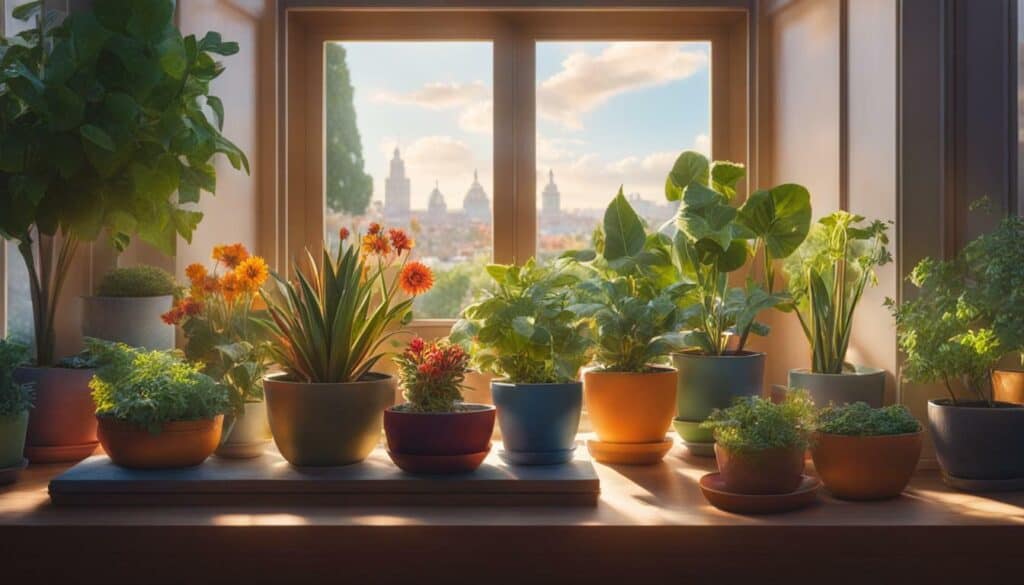
Recommended Plants for Beginner Gardeners:
- Tomatoes: These juicy fruits are relatively easy to grow and can be enjoyed in a variety of dishes.
- Zinnias: These colorful annual flowers are not only beautiful but also attract pollinators to your garden.
- Succulents: These low-maintenance plants are perfect for beginners and add a touch of green to any space.
- Marigolds: These vibrant flowers are known for their pest-repellent properties, making them a great addition to any garden.
Remember, gardening is a journey that requires patience and experimentation. Don’t be afraid to try new plants and techniques, and most importantly, enjoy the process of nurturing your green companions. Happy gardening!
Beginner-Friendly Gardening Techniques
Don’t let uncertainty hold you back! Learn about the beginner-friendly gardening techniques that will empower you to cultivate a thriving garden with confidence. Whether you have a spacious backyard or a small balcony, these techniques will help you make the most of your space and create a beautiful oasis of greenery.
One of the easiest ways to get started is through container gardening. This technique allows you to grow plants in pots or containers, making it ideal for those with limited space or poor soil quality. You can choose from a variety of containers, such as plastic pots, terracotta pots, or even repurposed items like old buckets or tin cans. Container gardening offers flexibility, as you can easily move your plants to optimize their exposure to sunlight or protect them from harsh weather conditions.
Another beginner-friendly technique is raised bed gardening. Raised beds are elevated garden beds built with wooden or stone frames. They provide better drainage and soil aeration, making it easier for plants to thrive. This technique is suitable for various types of plants, including vegetables, herbs, and flowers. Raised beds also make it easier to control weeds and pests, allowing you to focus on the joy of gardening without constant battles.
When it comes to gardening, knowledge is power. Educate yourself about the specific needs of the plants you choose to grow. Consider factors like sunlight requirements, watering frequency, and seasonal changes. Understanding the basics of gardening will help you provide the best care for your plants and ensure their healthy growth.
| Garden Technique | Benefits |
|---|---|
| Container Gardening | Perfect for small spaces or poor soil quality |
| Raised Bed Gardening | Improved drainage, easier weed and pest control |
Beginner-Friendly Gardening Tip:
“Start with a few easy-to-grow plants, such as herbs or leafy greens. They require minimal maintenance and provide a rewarding harvest.”
With these beginner-friendly gardening techniques, you’ll be well on your way to cultivating a thriving garden. Don’t be afraid to experiment and try new things. Gardening is a journey of discovery and learning, and each success and setback will bring you closer to becoming a confident and skilled gardener.
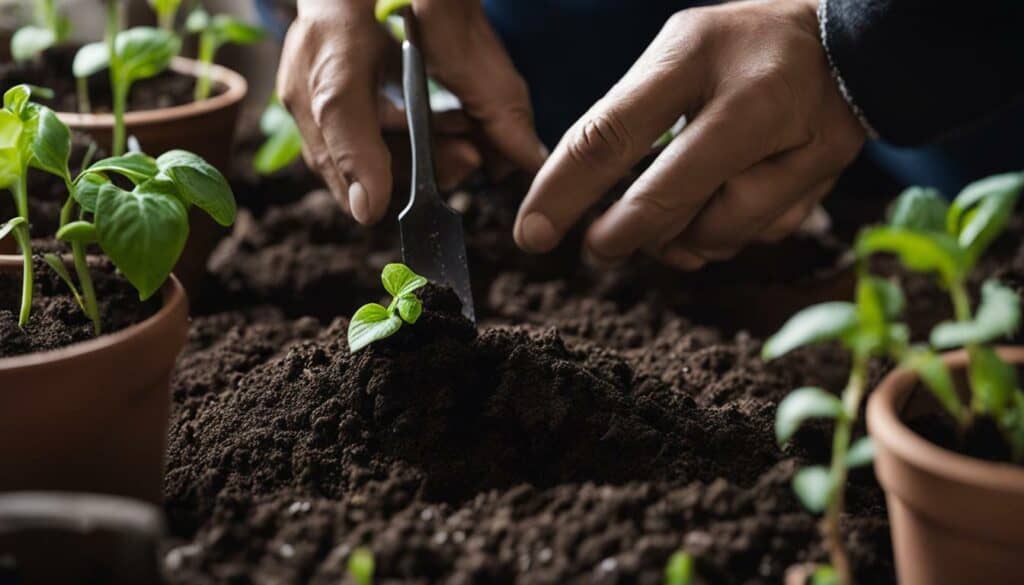
Tips for Caring for Your Garden
Your garden deserves the best care possible. Discover the essential tips and tricks that will keep your garden healthy, vibrant, and thriving. Whether you’re a beginner gardener or a seasoned pro, these tips will help you create a beautiful and fruitful garden.
1. Watering: Proper watering is crucial for the health of your plants. Be sure to water deeply and consistently, allowing the soil to dry slightly between waterings. Use a watering can or a drip irrigation system to ensure that the water reaches the roots of your plants.
2. Fertilizing: Give your plants the nutrients they need by fertilizing regularly. Choose a fertilizer that is appropriate for the type of plants you are growing, and apply it according to the instructions on the package. Organic options, such as compost or manure, can also be used to enrich the soil.
3. Pests and diseases: Keep a close eye on your garden for any signs of pests or diseases. Inspect your plants regularly, and take action at the first sign of trouble. Use organic pest control methods whenever possible, such as hand-picking or using natural predators, to minimize the use of harmful chemicals.
Garden Care Calendar
| Month | Tasks |
|---|---|
| March | Start seeds indoors, prepare the soil |
| April | Transplant seedlings, prune bushes and trees |
| May | Plant annuals, mulch flower beds |
| June | Water regularly, harvest ripe fruits and vegetables |
| July | Control weeds, deadhead flowers |
| August | Harvest and preserve herbs, prepare for fall planting |
“The love of gardening is a seed once sown that never dies.” – Gertrude Jekyll
Remember that gardening is a labor of love. Take the time to enjoy the process and appreciate the beauty of nature. Your garden will not only bring joy and relaxation but also provide you with fresh and flavorful produce. Happy gardening!
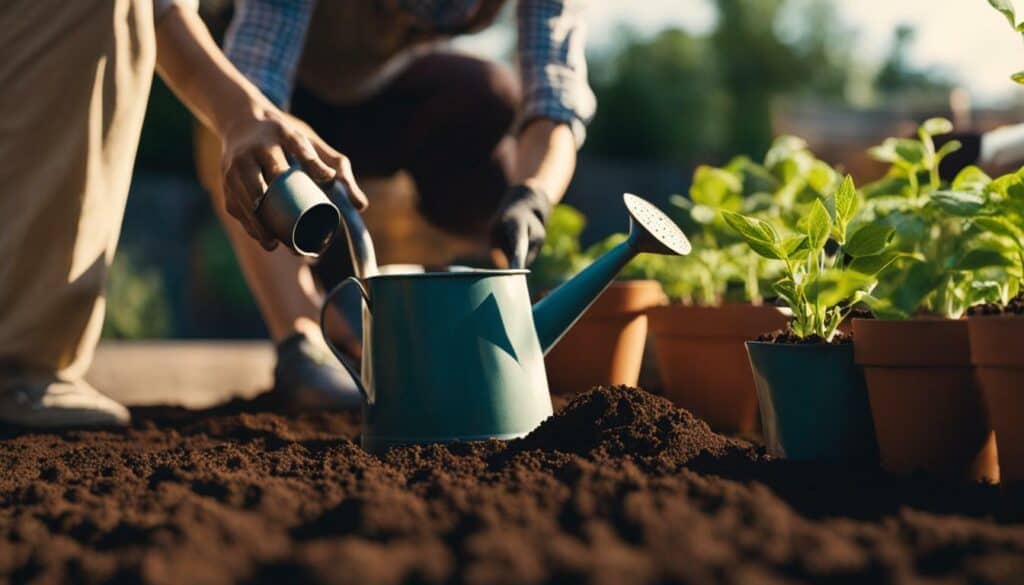
The Health Benefits of Gardening
Did you know that gardening is not only good for your plants but also for your physical and mental well-being? Let’s delve into the incredible health benefits of this rewarding hobby.
Gardening is a wonderful way to stay active and get your body moving. From digging and planting to watering and pruning, these activities provide great exercise for your muscles and joints. Whether you’re reaching, bending, or lifting, gardening helps improve strength, flexibility, and coordination. Plus, spending time outdoors in the fresh air and sunlight can boost your mood and Vitamin D levels, enhancing your overall sense of well-being.
In addition to the physical benefits, gardening also offers numerous mental health benefits. The act of tending to plants and watching them grow can be incredibly therapeutic and grounding. It provides an opportunity to relax, reduce stress, and connect with nature. Gardening can also stimulate the senses, with the sights, smells, and textures of colorful flowers and aromatic herbs, creating a calming and sensory-rich environment.
“Gardening is the purest of human pleasures.” – Francis Bacon
Furthermore, gardening can have a positive impact on your diet and nutrition. By growing your own fruits, vegetables, and herbs, you have access to fresh and nutritious produce right at your doorstep. This encourages a healthier diet and promotes self-sufficiency. There’s a special satisfaction that comes from harvesting your own homegrown ingredients and incorporating them into your meals.
So, whether you have a green thumb or are just starting out, gardening can be a valuable hobby for your physical and mental well-being. Get out there, tend to your plants, and reap the amazing health benefits this fulfilling activity has to offer.
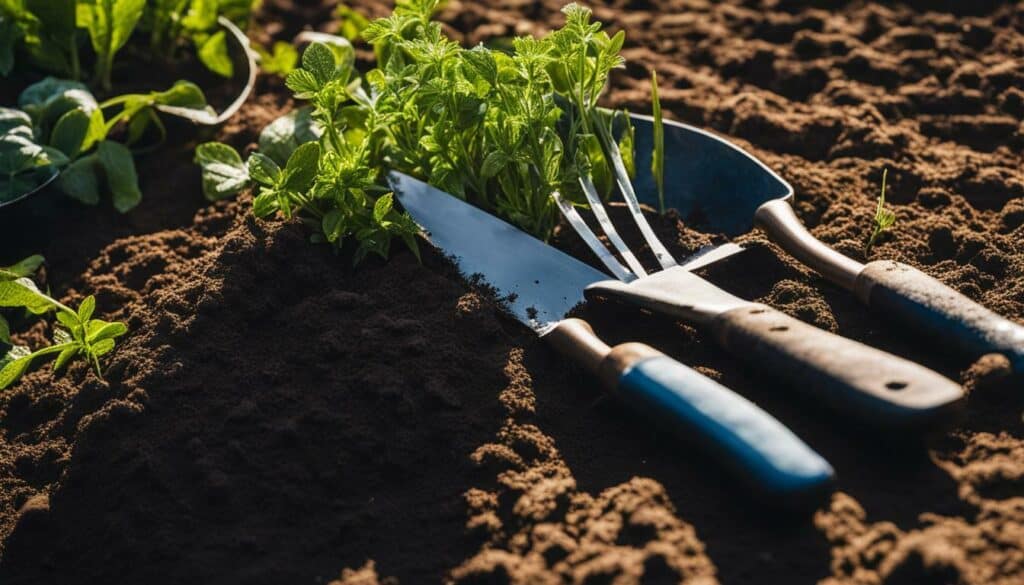
Health Benefits of Gardening summarized:
- Provides physical activity, improving strength, flexibility, and coordination
- Boosts mood and increases Vitamin D levels
- Reduces stress and promotes relaxation
- Connects you with nature and stimulates the senses
- Encourages a healthier diet and nutrition
| Physical Health Benefits | Mental Health Benefits | Nutritional Benefits |
|---|---|---|
| Improves strength, flexibility, and coordination | Reduces stress and promotes relaxation | Encourages a healthier diet and nutrition |
| Boosts mood and increases Vitamin D levels | Connects you with nature and stimulates the senses |
Gardening Safety and Well-being
Before you head out into your garden, let’s cover some important safety and well-being practices to ensure you have a rewarding and injury-free gardening experience. Gardening can be a wonderful and fulfilling hobby, but it’s essential to take precautions to protect yourself.
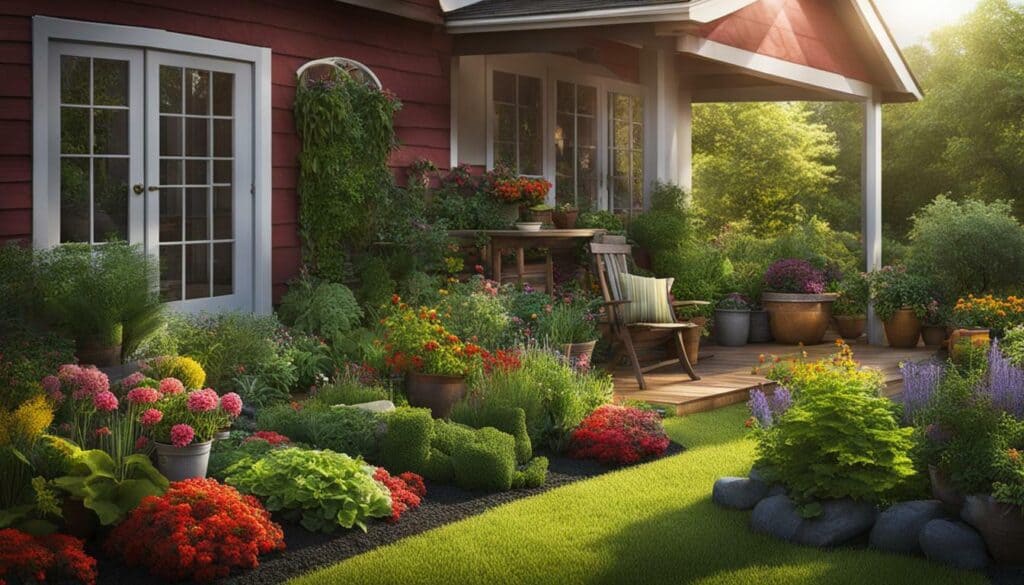
First and foremost, make sure you have the right tools and gear for the job. Invest in a good pair of gardening gloves to protect your hands from thorns, sharp objects, and harmful chemicals. Wear a wide-brimmed hat and apply sunscreen to shield yourself from the sun’s rays. It’s also a good idea to wear long sleeves and pants to minimize exposure to plants that may cause skin irritation.
As you work in your garden, remember to take regular breaks and stay hydrated. Gardening can be physically demanding, so it’s important to listen to your body and avoid overexertion. Take short breaks to rest and rehydrate, especially on hot and sunny days. Keep a water bottle nearby and drink plenty of fluids to stay refreshed and energized.
Gardening with Kids: A Fun and Educational Experience
Gardening with kids can be a rewarding experience that fosters their love for nature and teaches them valuable life skills. To make gardening enjoyable for children, provide them with age-appropriate tools and involve them in the entire process. Let them dig, plant seeds, water the plants, and watch them grow.
Create a “pizza garden” by planting various vegetables and herbs that can be used as toppings for homemade pizzas. This not only encourages kids to eat their veggies but also allows them to take pride in growing their own ingredients. They will learn about plant life cycles, the importance of caring for living things, and the joy of reaping what they sow.
Remember, gardening should be a fun and therapeutic activity. Take the time to connect with nature, enjoy the beauty of your plants, and celebrate the rewards of your hard work. Stay safe, take care of yourself, and revel in the fulfillment and satisfaction that gardening brings.
Gardening with Kids: A Fun and Educational Experience
Want to share your love of gardening with the little ones? Explore the endless possibilities of gardening with kids and create a fun and educational experience for the whole family. Gardening can be a great way to teach children about nature, responsibility, and where their food comes from. Plus, it’s a fantastic way to spend quality time together outdoors.
To start, get kids excited about gardening by involving them in the planning process. Let them choose the plants they want to grow, whether it’s colorful flowers or tasty vegetables. You can even create a themed garden, like a “pizza garden” with tomatoes, basil, and other ingredients they can use to make their own pizza.
When gardening with kids, it’s important to provide age-appropriate tools and equipment. Small, lightweight tools designed for little hands will make gardening more enjoyable and accessible. And don’t forget the gloves! They’ll protect little fingers from dirt and prickly plants.
As you embark on your gardening journey with kids, be sure to emphasize the educational aspects. Teach them about the different plant parts, how plants grow, and the importance of water and sunlight. Ask questions to encourage their curiosity and critical thinking. Gardening can be a hands-on science lesson right in your backyard!
Remember, the goal is to have fun and create lasting memories. So don’t worry about perfection. Let kids get messy, make mistakes, and learn from them. Gardening is a beautiful way to foster a love for nature and provide valuable life lessons that will stay with them for years to come. So grab your gardening tools, get outside, and start exploring the world of gardening with kids!
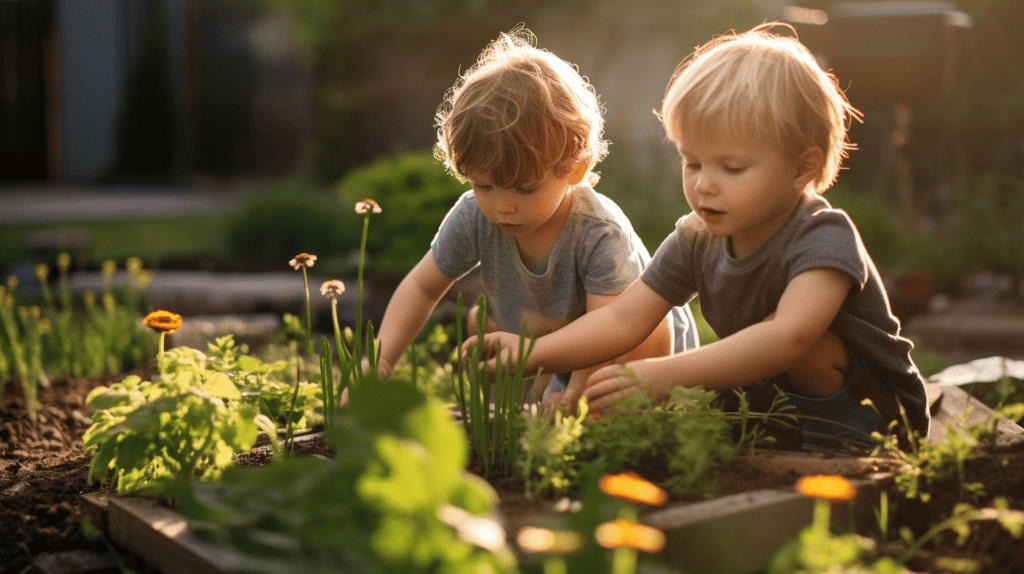
Fun gardening activities for kids:
- Create a scavenger hunt to find different types of flowers or insects in the garden.
- Plant a butterfly or hummingbird garden to attract these beautiful creatures.
- Start a worm compost bin and teach kids about the importance of recycling and soil health.
- Design and decorate plant markers using craft materials like popsicle sticks, paint, and glitter.
- Have a garden tea party with herbal teas made from fresh herbs grown in the garden.
With these activities and more, gardening with kids can be a delightful and enriching experience. So get ready to dig in, get your hands dirty, and watch your children blossom alongside their garden!
Enjoying the Fruits of Your Gardening Journey
It’s time to reap what you sow! Delight in the satisfaction of enjoying the bountiful rewards of your gardening journey and discover delicious ways to use your freshly harvested produce. There’s nothing quite like the taste of homegrown fruits, vegetables, and herbs, bursting with flavor and nutrients. Whether you’re savoring a juicy tomato straight from the vine or adding vibrant herbs to your favorite recipes, the joy of eating what you’ve grown is truly unparalleled.
One of the simple pleasures of gardening is the opportunity to experiment in the kitchen and get creative with your ingredients. Incorporate your homegrown produce into salads, stir-fries, and pasta dishes for a fresh and distinctive flavor. Try making homemade salsas or pestos using your own tomatoes, peppers, and herbs for a burst of freshness that will elevate any meal. And don’t forget about delicious homemade jams and preserves made from your ripest fruits, perfect for spreading on toast or adding to desserts.
| Produce | Harvest Time | Delicious Recipes |
|---|---|---|
| Tomatoes | When they are fully red and firm | Caprese salad, fresh tomato sauce, bruschetta |
| Basil | When it has large, vibrant leaves | Pesto, Caprese skewers, infused olive oil |
| Strawberries | When they are bright red and sweet | Strawberry shortcake, homemade jam, smoothies |
“The freshness of homegrown produce is unmatched, and it adds a whole new level of flavor to your dishes.”
Remember to share the joy of your gardening journey with friends, family, and neighbors. Host a garden-themed dinner party and showcase your delicious creations. Share your surplus produce with those around you, spreading the love (and the flavor) of your garden. And don’t forget to preserve some of your harvest for the colder months by freezing or canning your fruits and vegetables, so you can continue to enjoy the taste of summer all year round.

So, go ahead and dig in!
Enjoying the fruits of your gardening journey is a truly rewarding experience. From the moment you plant that first seed to the final harvest, every step in the process is filled with anticipation and excitement. So savor the flavors, celebrate your hard work, and relish in the satisfaction that comes from nurturing and growing your own food. Happy gardening!
The Joy of Starting Gardening as a Hobby
Congratulations! You’ve taken the first steps into the enchanting world of gardening. Embrace the joy, beauty, and endless possibilities of starting gardening as a hobby and watch your love for nature bloom.
Gardening is a truly rewarding endeavor that allows you to connect with nature and witness the incredible beauty of plants. There is something magical about seeing a tiny seed transform into a flourishing plant, filled with vibrant colors and delightful scents.
As you embark on this journey, remember to consider your local climate and soil conditions when choosing what to grow. Take the time to prepare the ground by clearing weeds and testing the soil to ensure the best conditions for your plants to thrive.
Once you’ve prepared the soil, it’s time to choose the right plants for your garden. Whether you opt for perennials that return year after year or annuals that dazzle with their seasonal splendor, selecting the perfect plants is a joyful process.
Remember to care for your garden diligently, providing water, nutrients, and protection from pests. Enjoy the process and take pleasure in watching your garden flourish. The rewards of gardening go beyond the beauty of the plants; it also offers numerous health benefits. Engaging in physical activity, reducing stress, and enjoying the fruits of your labor are just a few of the ways gardening can improve your overall well-being.
As you immerse yourself in this hobby, make sure you have the essential tools and gear. Take breaks, stay hydrated, and protect yourself from the sun’s rays. And if you have little ones joining you on this gardening adventure, create a fun and educational experience for them by providing age-appropriate tools and cultivating a “pizza garden” where they can grow ingredients for their very own pizza creations.
So, grab your gardening gloves, dig your fingers into the earth, and let the beauty of nature inspire you. Starting gardening as a hobby is a journey filled with wonder, growth, and endless fascination. Welcome to the magical world of gardening!
What Are the Basics of Indoor Organic Gardening for Beginners?
Indoor organic gardening for beginners involves growing plants inside your home using natural methods. Start by choosing the right plants that thrive indoors and require minimal sunlight. Ensure you have well-drained containers or pots, nutrient-rich soil, and organic fertilizers. Remember to water your plants as needed and provide adequate light sources. With patience and care, your indoor garden will flourish.
FAQ
Q: How do I get started with gardening?
A: To get started with gardening, decide what you want to grow and consider your local climate and soil conditions. Prepare the ground by clearing weeds and test the soil to determine its type and quality. Once you’ve prepared the soil, choose the right plants for your garden and learn when to plant them.
Q: What are the health benefits of gardening?
A: Gardening has numerous health benefits, including physical activity, stress reduction, and the opportunity to eat fresh produce you grow yourself. It can improve your mood, enhance mental well-being, and provide a sense of accomplishment.
Q: What tools do I need for gardening?
A: Essential gardening tools for beginners include a spade, trowel, gloves, and watering can. These tools will help you dig, plant, and maintain your garden effectively.
Q: How can I choose the right plants for my garden?
A: When choosing plants for your garden, consider your location and the local climate. Opt for plants that are suitable for your soil type and are easy to grow. Consulting with local gardening experts or researching online can help you find the right plants for your garden.
Q: How can I care for my garden?
A: To care for your garden, it’s important to water regularly, fertilize as needed, and monitor for pests and diseases. Proper pruning and weeding will also help maintain the health and aesthetics of your garden.
Q: How can I stay safe while gardening?
A: When gardening, it’s essential to wear proper protective gear such as gloves and sun protection. Take breaks, stay hydrated, and be mindful of your physical limitations to avoid strain or injury.
Q: How can I involve my kids in gardening?
A: Gardening with kids can be a fun and educational experience. Provide age-appropriate tools and create a “pizza garden” with ingredients they can use to make their own pizza. This will help them learn about plants, nature, and the joy of growing their own food.
Q: How can I enjoy the fruits of my gardening labor?
A: Enjoying the fruits of your gardening journey involves harvesting the crops you’ve grown and using them in your meals. This allows you to savor the flavors of fresh, home-grown produce and take pride in the results of your hard work.

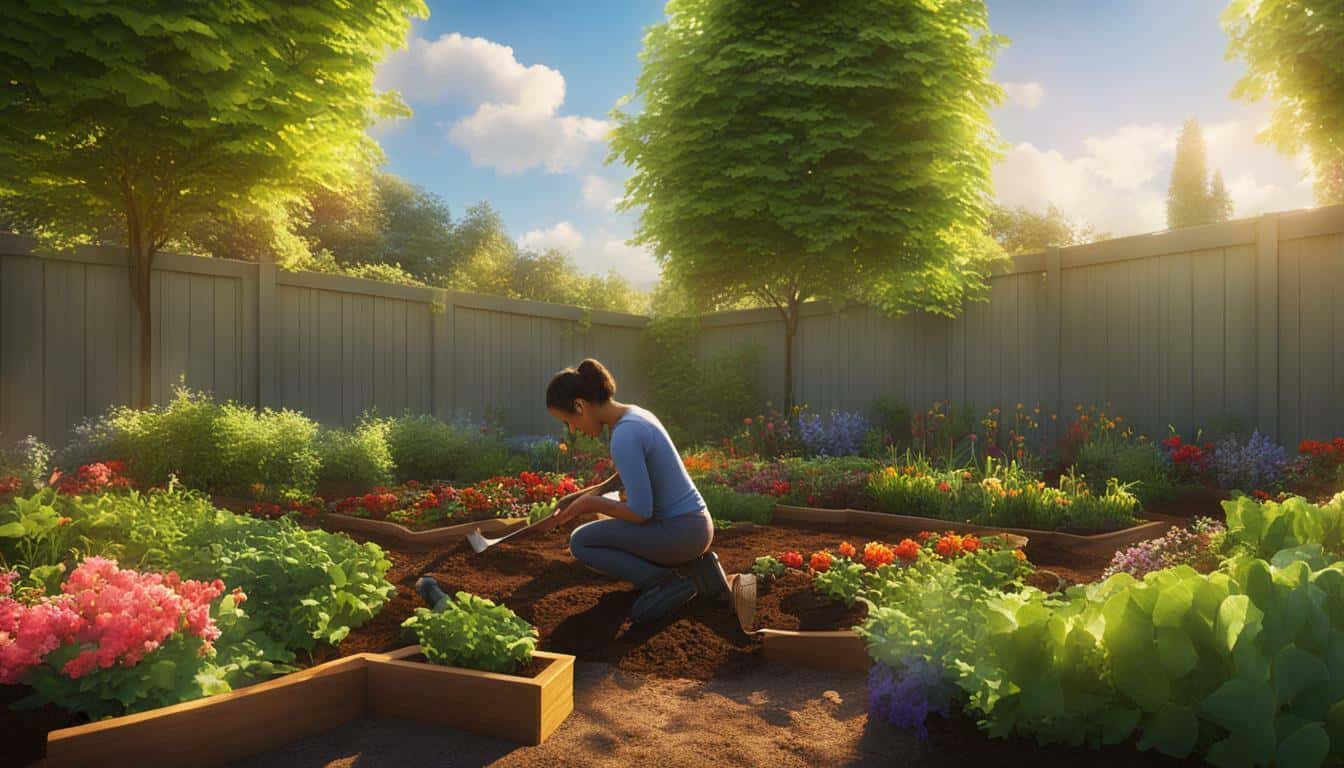
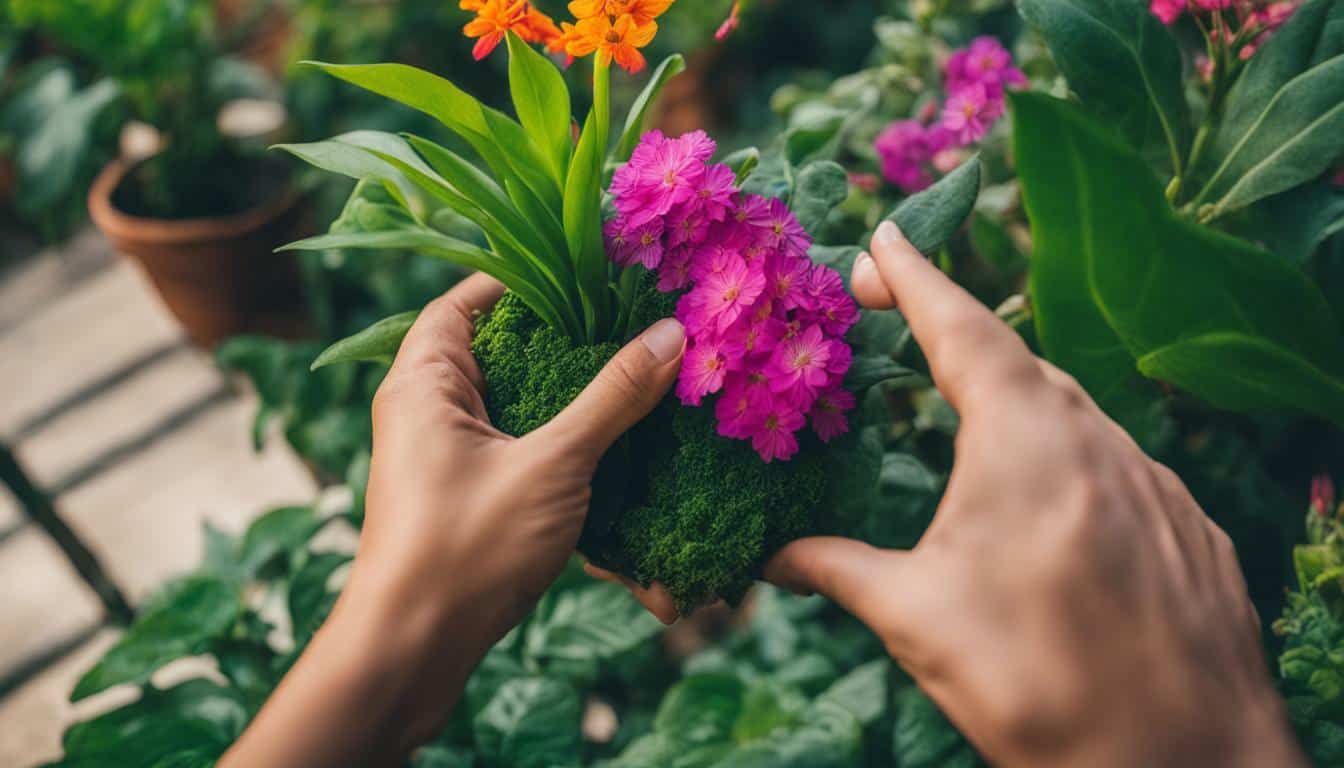
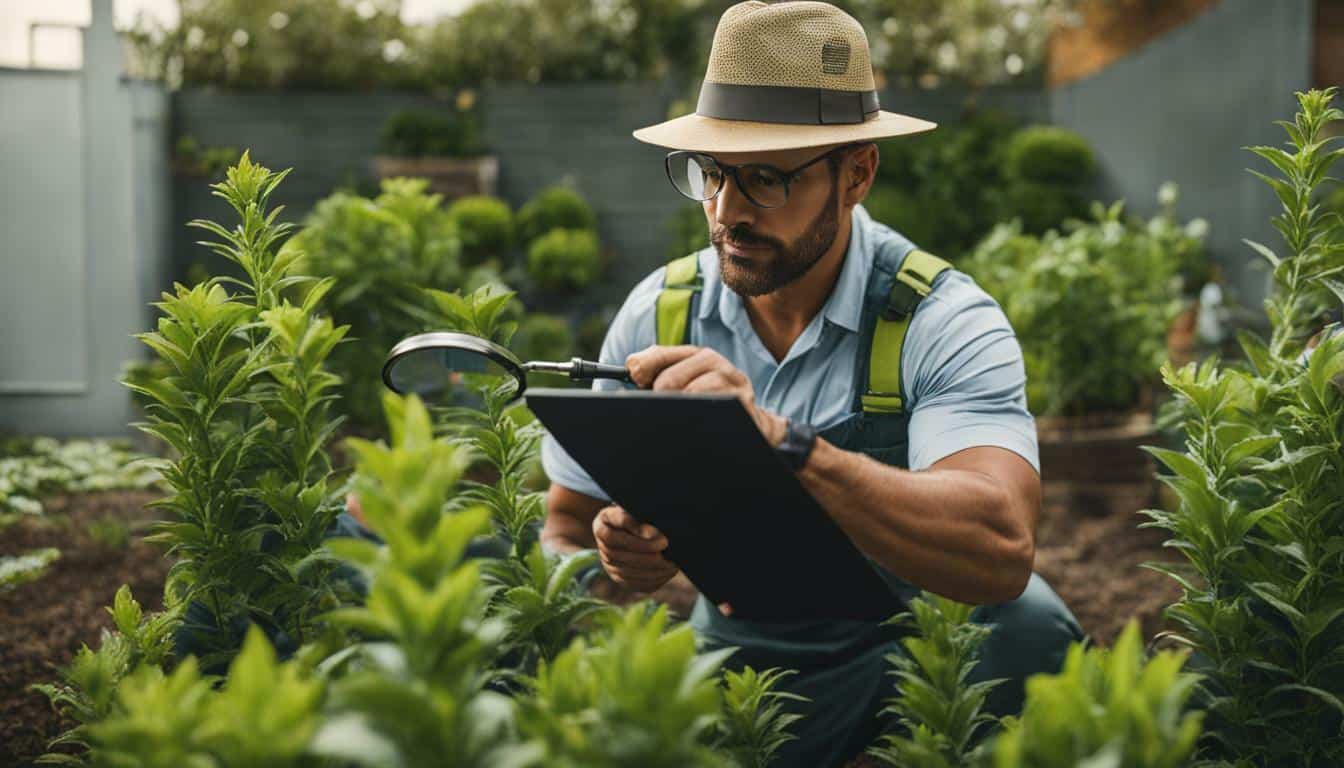

Leave a Reply